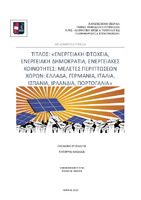Ενεργειακή φτώχεια, ενεργειακή δημοκρατία, ενεργειακές κοινότητες. Μελέτες περιπτώσεων χωρών : Ελλάδα, Ιταλία, Γερμανία, Ισπανία, Πορτογαλία, Ιρλανδία

View/
Abstract
More than 50 million households in the European Union experience energy poverty, they have little or no access to basic energy services such as electricity, heating and cooling.
The prevailing approach to defining energy poverty is that of the United Kingdom, according to which a household is considered fuel poor if it is to spend more than 10% of its income on energy.
Energy cooperatives play a very important role in highlighting and addressing energy poverty. They promote energy democracy through collective processes and the way they are organized and provide energy to community members. Producing and promoting the use of renewable energy at local level (electricity, heating or cooling) can make an important contribution to tackling energy poverty. Members of energy communities are able to meet their own energy needs, combat energy poverty and create jobs without expecting the state or private investors to do it for them.
The purpose of this paper is to examine the situation of energy poverty and energy communities in six European countries, Greece, Germany, Spain, Italy, Portugal, Spain and Ireland.


